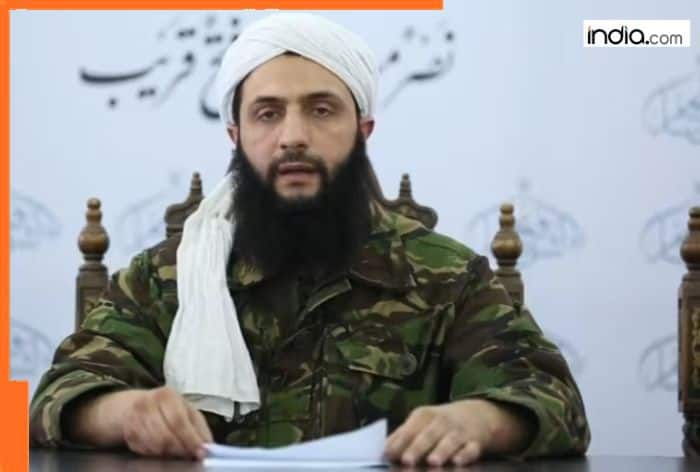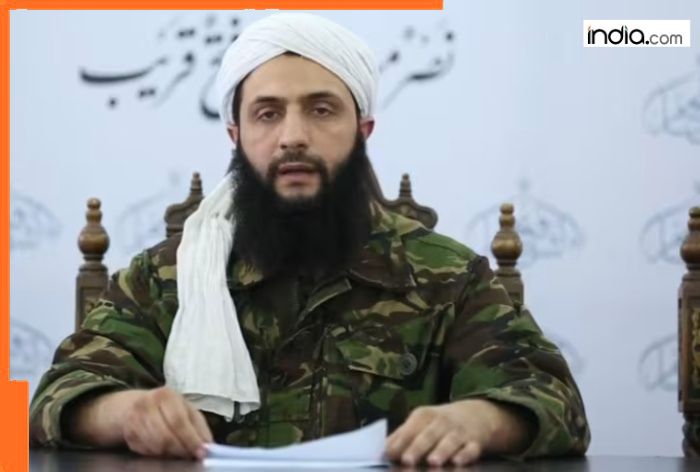At the helm of the rebel forces in the Syria civil war, is the Hayat Tahrir al-Sham (HTS), a controversial Islamist extremist outfit formerly affiliated with the Al-Qaeda.It has led the charge against the forces of President Bashar al-Assad.

Abu Mohammad al-Julani (File)
Syria civil war: Syrian rebels, who rekindled the rebel insurgency against President Bashar al-Assad-led regime late last month, have since captured three major cities — Aleppo, Hama, and more recently Daraa — running roughshod over Assad’s forces who have retreated in wake of the overwhelming onslaught.
At the helm of the rebel forces is the Hayat Tahrir al-Sham (HTS), a controversial Islamist extremist outfit formerly affiliated with the Al-Qaeda. HTS has led the charge against the regime forces, capturing Aleppo, Syria’s second largest city, and later Hama.
The HTS is led by Abu Mohammad al-Julani, a mysterious figure who is wanted by the United States and carries a $10 million bounty on his head.
Who is Abu Mohammad al-Julani?
The origins, including the real name of Abu Mohammad al-Julani, are a mystery, though various sources claim that his real name is Ahmed al-Shara, and is a Syrian from the Golan region.
According to several reports, Abu Mohammad al-Julani was born Ahmed al-Shara in Riyadh, Saudi Arabia, where his father used to work. However, al-Julani is said to have grown up in Syrian capital Damascus.
Other reports claim that al-Julani was born in Deir ez-Zor in eastern Syria and reportedly studied medicine before joining an Islamist extremist outfit.
According to the UN and European Union, he was born between 1975 and 1979. Interpol believes he was born in 1979, whereas a report by As-Safir mentions his birth date as 1981. Nonetheless, while, al-Julani’s origins remain shrouded in mystery, one thing is clear, he is one of the masterminds behind rebel insurgency against the Assad regime in Syria.
How al-Julani came to lead Hayat Tahrir al-Sham?
In 2003, when US and its allies invaded Iraq and deposed its leader Saddam Hussein, al-Julani is believed to have joined al-Qaeda, who along with other extremist group, resisted the US-led invasion.
In 2010, US forces stationed in Iraq arrested al-Julani and held him at Camp Bucca, a prison near Kuwait. Intelligence agencies believe that it was here he met fellow jihadists who later formed the Islamic State group. Its also believed that al-Julani met Abu Bakr al-Baghdadi, who later became the ‘Caliph’ of the Islamic State (IS) terror group, at Camp Bucca.
In a 2016 message to the media, Abu Mohammad al-Julani revealed that al-Baghdadi had sent him to strengthen IS cadres in Syria when armed insurgency broke out against President Bashar al-Assad began in 2011. There he became the commander Nusra Front (or Jabhat al-Nusra), an armed insurgent group with secret ties to the Islamic State, which was at the forefront of the armed conflict against Assad regime,
However, in 2013, al-Julani severed the Nusra Front’s ties with IS and brought it under the umbrella of al-Qaeda, a relationship which continued till 2016, when Julani announced that he had separated from the global extremist outfit.
In 2017, al-Julani said his fighters had merged with other Syrian rebel groups to form Hayat Tahrir al-Sham (HTS), the group currently leading the rebel charge against Assad regime.
‘Global jihad not my goal’
Abu Mohammad al-Julani as emerged as the undisputed leader of Hayat Tahrir al-Sham, and by extension of the entire rebel effort to oust Bashar al-Assad from power. Under his leadership, HTS has emerged as the main rebel group active in Idlib and its surrounding areas in northwestern Syria.
HTS controls the ‘Salvation Government’ in Idlib province, acting as a local administration in providing health, education and internal security.
In a 2021 interview with PBS, al-Julani he disagrees with al-Qaeda’s strategy of global jihad, and asserted that his main goal was to oust Syrian President Bashar al-Assad from power, adding “America and the West also have the same goal.”
“This region does not pose any threat to the security of Europe and America. This region is not a platform for carrying out foreign jihad,” al-Julani was quoted as saying.
Notably, in 2020, HTS shut down al-Qaeda bases in Idlib, confiscated weapons and jailed some of its leaders. The rebel group also curbed the activities of Islamic State in the region.
‘Liberal jihadists’
Although the group enforces Islamic Sharia Law in areas under its control, the stringency is far less compared to other jihadist groups. The group also publicly interacts with Christians and non-Muslims, and has faced criticism from other jihadist groups for its “more” liberal stance.
However, despite these liberal overtures, the HTS has been accused of gross human rights violations and violent suppression of public protest, charges denied by al-Julani.
Many western and Middle East governments, as well as the United Nations Security Council, have classified HTS as a terrorist organisation, primarily because of al-Julani’s past association with the al-Qaeda.
Abu Mohammad al-Julani carries a bounty of $10 million dollars on his head, announced by the United States.
